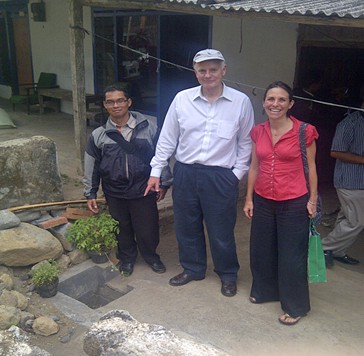
From the effects of sea-level rise to changing rainfall patterns, freshwater supply in Indonesia is highly sensitive to the impacts of climate change. Unless something is done quickly, the ability of Indonesian water utilities to serve rapidly growing urban populations is seriously at risk. To address this emerging issue, USAID’s Indonesia Urban Water, Sanitation and Hygiene (IUWASH) project has a promising intervention under development – infiltration ponds. Infiltration ponds collect rainwater normally lost as runoff and allow it to infiltrate into spring aquifers.
In the East Java District of Mojokerto, Coca-Cola and USAID have jointly committed approximately $750,000 to construct 2,000 water infiltration ponds. The “ponds” are eight cubic meter tanks with dirt floors with concrete tops at surface level. Runoff rain and floodwater enters the tanks through a small aperture. The ponds on average drain out a hundred times per tank per year.
A key goal of IUWASH is to increase access to safe water for 2 million people, especially the urban poor. The declining availability of “raw water” from the springs and wells, on which many local water utilities rely, is seriously hampering 40 percent of the target municipalities.
Constructing infiltration ponds is one of the easiest ways to artificially increase groundwater recharge. The infiltration ponds capture rainwater from upstream catchments that would normally be lost as runoff into nearby streams and collect it in small ponds, where the water can infiltrate into the ground and recharge the aquifer. The water stored in the aquifer can then be used during dry periods, either to fill shallow wells or to feed spring intakes for downstream users.







Comment
Make a general inquiry or suggest an improvement.